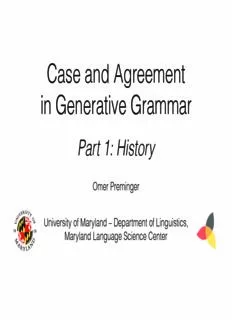
Case and Agreement in Generative Grammar PDF
Preview Case and Agreement in Generative Grammar
Case and Agreement in Generative Grammar Part 1: History Omer Preminger University of Maryland – Department of Linguistics, Maryland Language Science Center The rise of case & agreement (but mostly case) A brief prologue • In early generative grammar (e.g. Chomsky 1955/1975, 1957, 1965), attention was paid to some kinds of morphology ➻ most notably, the verbal suffixes of English ("Affix Hopping") • Syntactic Structures (1957) and Aspects (1965) also included dedicated transformations for the transmission of phi‑features across different categories in English NB: "phi‑features" = {PERSON, NUMBER, GENDER/NOUN‑CLASS} 3 • Chomsky (1957:112): • Chomsky (1965:175): [technically, not an agreement rule, but a nominal concord rule; we'll get back to this] 4 • Question: Why even have a transformation for phi-feature transmission? ➻ Couldn't we model phi-feature transmission via Phrase Structure (PS) rules? (Syn Struc; Chomsky 1957:29) (cid:15482) Can you see the problem with this PS-rules solution? 5 (GPSG; Gazdar, Klein, Pullum & Sag 1985:89) • NB: We will see that there are rather clear empirical reasons to reject even the “modularized” PS (sub‑)rule treatment of agreement, as in GPSG. 6 ➻ But at this stage of the theory, plenty of morphology was also flat out ignored… • This is not intended as a criticism, of course; no scientific investigation is expected to come up with a "Theory of Everything" right from the start • it is natural to abstract away from some properties, while trying to explain the others 7 (cid:15482) So how did agreement and, in particular, case become "center stage" in generative linguistics? 8 • Chomsky & Lasnik (1977): the [* NP V ] filter inf • there is a set of phenomena that look, at first glance, to be completely heterogeneous — ‣ "Equi" (a.k.a. Control) ‣ prepositional complementizers ‣ Raising ‣ a select group of exceptional predicates (believe, expect, consider, etc.) • but they can be unified when we observe that they are all repairs of the same potential violation • cf.: "conspiracies" in phonology (Kenstowicz & Kisseberth 1979) 9 Case as licensing • Jean-Roger Vergnaud (in a 1976 letter to C&L, responding to a pre-pub ms. of Filters & Control): • all of these repairs (except for Equi/Control...) have something in common — ➻ they are the environments where one finds (e.g. in Latin) accusative, rather than the expected nominative, on the subject (cid:15482) ... and thus was born the theory of Abstract Case (Chomsky 1981 et seq.) 10
Description: